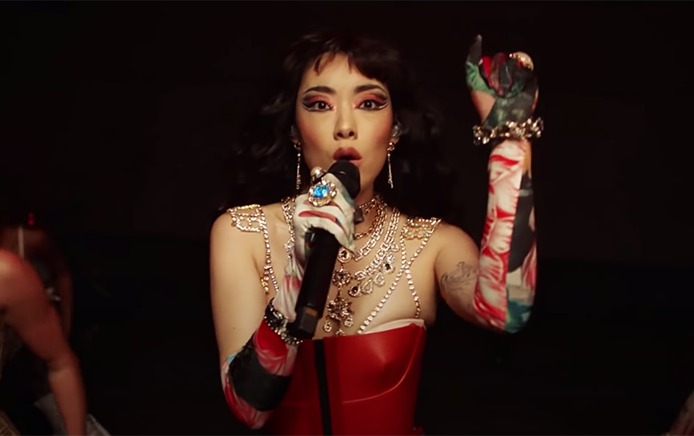by Kellyn Harrison
Despite the alarming number of assignments congregating on my to-do list and the mountains of textbooks piled on the desk in my tiny dorm room, I scrolled through Tik Tok. I did this because it is the only thing that drags me from the pull of schoolwork and gives me a break from the pressures of being a sophomore in college. Most of my feed includes memes and music, so I am used to people on the platform recommending me new music. But it was the dreamy and up-beat sound used as a dramatic parallel to the heavy references including systematic racism and generational trauma that drew me to Rina Sawayama. I immediately searched for her music and have been listening to her self-titled debut album since then. In fact, I am listening to it now as I fiercely type at the very desk I should be finishing homework at. Instead, I need to share with the world how groundbreaking Sawayama is, so her music can be spread and appreciated as the piece of art it is.
Dynasty
The British-Japanese model and singer-songwriter’s debut album includes multiple songs heavily laced with resentment towards her parents and an attempt to forgive them. Rina, age 5, moved to London due to her father’s job in the airline business but found herself in the middle of her family’s messy divorce a couple of years later. Rina fought for some sense of common ground between the persistently conflicting accounts her parents fed her about each other. Thereafter, Rina went from seeing her father three times a year to once or twice a year and sharing a single room with her mother for years. Even though they lived in the same room, Rina and her mother did not get along. Rina was viewed as a problem child for sneaking out and acting out after her parent’s divorce, which the artist believes to have fueled the resentment in their mother-daughter relationship.
“I wanted to write about familial pain, intergenerational trauma, and try to make it into a pop song. I really wanted to write an honest, damning portrait of my family that has been torn apart by money,” said Sawayama in an interview with NPR. “On my dad's side, there's a lot of exchange of love with money, and that sort of skews people's perspective of love, and I sort of didn't understand what love was for the longest time. I didn't understand that the parental love that you're supposed to get is not meant to be conditional on you doing something. It was a very mixed portrait when I was growing up.”

Image from VICE
The song “Dynasty” discusses her experiences growing up in a dark and tense environment. It references the hurt she faced as a result of her parent’s divorce and the allegations spewed between the two, and the underlying factors tied to the allegations including financial pretenses and infidelity. Songs like “Akasaka Sad” reference back to “Dynasty” by pointing out the intergenerational depression and mental health issues rooted in her family because of the burdens mentioned in "Dynasty".
“Mother and father, you gave me life...I nearly gave it away for the sake of my sanity...(Hurting inside, no end in sight)...(Passing it down, am I losing this fight?)...Mother and father, I know you risked everything...Fighting about money and his infidelity...(Now it's my time to make things right)...And if I fail, then I am my dynasty” - “Dynasty”
But in the end, it is about Rina coming to terms with her past and taking claim of her ‘throne’. Her ‘throne’ symbolizes her identity because she explains that when you are raised in a broken family your story is your parent’s, due to how the situation surrounds your entire mental being. Now, she knows her identity and what her story is despite her damaging past, and—as written into the song “Snakeskin”—she is continuing to make her narrative her own. This includes her growing appreciation for her Japanese roots. She resented her mother for her Japanese heritage because her mother’s continuously deep connection to the culture served as a constant reminder of the differences between Rina and her classmates. Systematic racism was a constant battle for Rina while studying at Cambridge University.
Chosen Family

Image from Gay Times
Rina’s music is shaped by many other factors including cultural appropriation, self-love, wealth, and environmentalism. “XS” is a satirical reference to capitalism and people’s need to buy name-brand products just because it shows a sign of status despite its unnecessity. Especially when we are in a pandemic and many of those products have to be delivered by people risking their health. “F**k This World” is Rina’s disappointment in how people treat the world around them because it impacts the climate/environment we live in. “Tokyo Love Hotel” talks about people’s infatuation with Japanese culture and how it can impact the very roots of the culture by never extending courtesy to those who live in Japan. “Love Me 4 Me” references Ru Paul’s Drag Race saying, “And remember...if you can’t love yourself then how the h*ll you gonna love somebody else?” It professes self-love and makes sure you take care of yourself above all else.
Sexuality is a recurring idea within Rina’s music. “Chosen Family” exemplifies this idea perfectly by stating all members of the LGBTQIA+ community chose their own families within the community because they may not feel accepted by their birth families. This idea is something Rina has connected to because of her identifying as pansexual and being placed in a straining relationship within her own family. She feels a connection to those who also relate to the song and invites those who identify in the community to be her chosen family, as well. Rina purposely made the song soft and comforting to create a sense of safety and hope while listening to the music.
Gender is another huge factor impacting the creation of Rina’s music. Rina has expressed concerns over the music industry’s lack of diversity in its production process and how obvious it is in the music broadcasted on the radio today.
“I understand that when you’re with a label or a publisher it’s hard to turn down those people, but as women, and especially as queer people, we need to say no to things and be heard and stick our head above the water. It’s an issue, and I’m constantly trying to work with different people,” said Rina in an interview with Gay Times Magazine.
Rina’s consciousness towards diversity and inclusivity—not only in her songwriting but in her production process—has greatly impacted the creative process of her music, and it greatly shows. Her nu-metal-infused pop music has been raved as some of the best music to come out of 2020. Elton John even recognized the debut album SAWAYAMA as his favorite record of the year in 2020.
Rina has become a groundbreaking artist for the conflicting styles of music her songs portray, with many unsure which genre fully encompasses her music; that's if her music can be confined to one genre. Rina is breaking out of the constraints labels in music place, and it has proven its worth amongst her listeners and those just now picking up on the high-quality satirical tunes of Rina Sawayama.
Here you can listen to SAWAYAMA
Recommended Tracks: “Comme Des Garçons (Like the Boys)”, “Love Me 4 Me”, “F**k This World”, “Who’s Gonna Save U Now?”, “Chosen Family”, “Dynasty”, “XS”
Sources: Billboard, Gay Times, Genius, Independent, NPR, Pitchfork, The Guardian, YouTube
Images: Gay Times, Vice
Featured Image: Rolling Stone




















